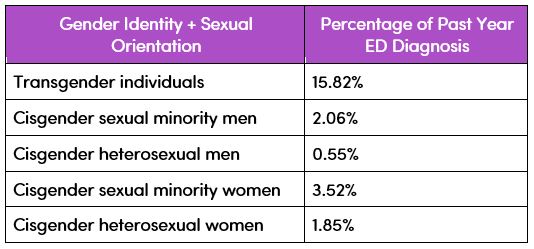Eating Disorder Prevalence in the LGBTQ+ Community
June 1st marks the beginning of Pride Month in the United States. Pride is a time for LGBTQ+ individuals to celebrate and recognize the work that has been done to achieve equal justice for lesbian, gay, bisexual, transgender, and questioning individuals. Pride is also a time for allies to show their support. The first step an ally can take is education. As allies begin to better understand the inequalities that this community faces, they can be better advocates to create change.
The LGBTQ+ community has made many strides in the past 50 years of Pride celebrations, but there is still work to be done. LGBTQ+ mental health is an area of particular significance. Eating disorders disproportionately affect individuals within this community. A 2015 study that looked at eating disorder prevalence in college students found that 1.85% of cisgender, heterosexual women had been diagnosed with an eating disorder in the past year, while 15.82% of transgender individuals had been diagnosed with an eating disorder.1
What would cause such a drastic increase in eating disorders diagnoses for sexual minority individuals? The research points to two contributing factors.
1. The spike in eating disorder prevalence for transgender individuals can partially be attributed to the use of disordered eating behaviors to suppress or accentuate specific gendered features in an attempt to create congruency between one’s gender identity and physical body. “It has been suggested that striving for weight loss may be a way for transgender women to conform to feminine ideals of slimness. Transgender men and women may also use weight loss to suppress secondary sexual characteristics1.”
2. Minority stress is another primary factor that can affect mental health outcomes across the entire LGBTQ+ community. This type of stress is experienced by those who belong to stigmatized groups experiencing discrimination, violence, victimization, the pressure to conceal their identity, social alienation, and internalized stigma because of their identity.
Being an ally can begin by challenging the notion that eating disorders only affect white, straight, cisgender women. Eating disorders do not discriminate. Whether you are a clinician, a loved one, or someone struggling with mental health, recognizing the larger population affected by eating disorders allows vulnerable, minority groups to be seen, heard, and access care.
1. Diemer, E. W., Grant, J. D., Munn-Chernoff, M. A., Patterson, D. A., & Duncan, A. E. (2015). Gender identity, sexual orientation, and eating-related pathology in a national sample of college students. Journal of Adolescent Health, 57(2), 144-149.

